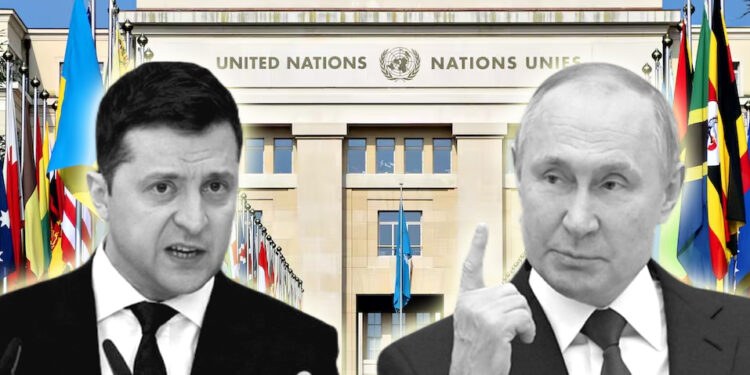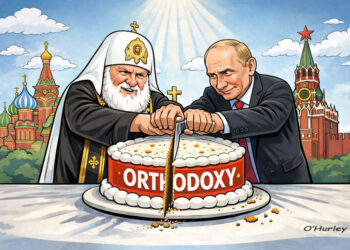by Aimen Jamil
Special Guest Columnist
Islāmābād — Multilateral diplomacy is a crucial component of world diplomacy in light of current issues and globalization. Only through mutual cooperation, we can handle the global challenges we are experiencing, such as climate change, migration, sustainable development, opportunities and threats of new technologies, and conflicts among the states. Multilateral diplomacy is the collaboration of three or more nations working towards a shared objective. Congresses and conferences have played a major role in its development alongside bilateral diplomacy. Co-founding international organizations, particularly the United Nations, the Council of Europe, the OSCE (Organisation for Security and Cooperation in Europe), and the European Union, marks the beginning of contemporary multilateral diplomacy. In multilateral diplomacy, different aspects hold significance in this multi-layered world. This article aims to scrutinize the stance of states in the ongoing conflict between Russia and Ukraine. And how the global diplomacy fails in this regard. As multilateralism is in profound crisis. The urgent need for stronger international cooperation and communication is apparent and unavoidable given the threats to multilateralism.
We have to accept the fact that cooperation across tribal and international borders is essential to humanity’s survival. There will be fewer wars and more diplomacy as a result of increased social and economic interdependence. We will examine how Russia- Ukraine conflict has affected cooperation and interdependence, forcing countries to become more sufficient to fulfil their own needs. As Russia is the largest gas supplier to Europe, it has halted the supply as the result of West sanctions on Russia. They have started looking for the alternatives to fulfil their needs. It is not the conflict of two states rather existential threat to the entire world.
Even when a government adamantly refuses to declare war, conflict nonetheless happens. It’s not always successful to deter a violent invader with calm dialogue and delaying measures. In the news media, diplomacy and the use of force are occasionally presented as binary possibilities, yet they are frequently combined. Force can be used as a threat to encourage compromise. War can result from ineffective diplomacy. Once a war breaks out, diplomatic efforts to prevent more bloodshed, reduce the number of casualties among civilians, and secure a cease-fire continue and frequently intensify. When diplomacy fails, war breaks out. According to this theory, diplomacy stands at the forefront of both domestic and global security and peace. Devastating conflicts between nations and even global wars have resulted from diplomatic failure. Therefore, the ongoing conflict in Ukraine represents a failure of international, European, Russian, Ukrainian, and global diplomacy if prevention is the primary purpose of diplomacy
The war against Ukraine has been going on for seven months with no end in sight, and recent measures by Russia even suggest that the conflict will get worse. For the sake of Ukraine, Russia, Europe, and the rest of the world, the Russian leadership ought to stop the aggression and re-evaluate the unacceptable course it has taken. Since the start of the conflict on February 24th, four Russian presumptions have been shown to be utterly false: that the Ukrainian government would fall and Russian forces would swiftly seize Kyiv and other Ukrainian cities; that the European Union would struggle to demonstrate resolve and respond to this aggression; that the “Western world” would be divided and uncertain in its response; and that the larger international community would not denounce Russia’s invasion.
The defining characteristics of the battle have been the bravery of Ukrainians and the cooperation of their allies. In the face of aggression, Ukraine and its allies demonstrated admirable resolve and unity. Ukraine is resilient against Russia till now with military and economic aid from the West. And to further provide assistance to Ukraine Europe has come up with the plan ‘Survive and Thrive’
Military security – Under a new security agreement reached by the EU and Ukraine, the EU and its member states would offer long-term military aid to Ukraine. This would entail delivering weaponry and equipment to the Ukrainian military and security forces as well as providing instruction and technical support in fields like cyber.
Security guarantees – The EU’s member states would add a comprehensive set of security guarantees to the military aid given through the security compact. These would outline the kind of enhanced assistance they would provide to Ukraine in the event of several probable Russian escalations.
Economic stability – The EU would continue to give money to Ukraine in order to stabilise its economy and start the drawn-out rehabilitation process. The EU would also equip Ukraine with a “partnership for enlargement” in order to establish a long-term vision of integration with Europe. This would provide Ukraine access to the European market, maybe allow it to receive cohesion funds, and aid in its long-term preparation for EU membership
Energy security – Lastly, in order to assist Ukraine in more closely integrating its energy infrastructure with that of the EU and meeting its international climate obligations, the EU and its member states would expand on Ukraine’s membership in the EU energy union. The EU would also give Ukraine a “Just Transition Fund,” modelled after the internal Just Transition Fund of the EU Cohesion Policy, to lessen the social effects of the energy transition.
Despite giving all the assistance to Ukraine to fight and rebuild the country, the West and global diplomacy were not able to stop the Russian invasion of Ukraine. The recent announcements of Russia having a referendum in the Russian-backed separatists in Donetsk, Luhansk, Kherson, and Zaporizhia has further escalated the situation.
UN’s Death Blow
If we look around there is a lot of unrest in the world. There is a clash of civilizations, power politics, chaos in the world order, humanitarian crisis, countries are in wars, many countries are at the verge of war, climate change, economic crisis, extremism and pandemic continue to affect people in one way or another. This uncertainty in the world makes us think about the role of institutions, for which they were made for prevailing peace in the world. Many institutions have failed to do so and collapse ultimately. This really forces us to think and question about the false promises of liberal democracies and the role of institutions in this anarchic world. After WW1 League of Nations was formed. It failed to maintain its mandates that revolve around maintaining peace in world order, provide security to the states and prevent future wars and eventually fall in. Leading the world in another war marked in the history as WW2. As a result of this war United Nations was formed, somehow it managed to survive till date. But there are many happenings that points finger on the credibility of United Nations. Today UN is in the difficult moment as the world faces climate change, trade wars, great power competition and the breakdown in the international cooperation. Because of the inability of UN to maintain the world order, it has brought the world to the verge of WW3 proving that realism holds the ground till now putting liberalism aside. It has failed to provide human rights, prevent civil wars in Syria and Yemen, to solve the issues of the disputed territories of Kashmir and Palestine and to provide the humanitarian assistance to the needed areas. UN actions and decisions are influenced by the great powers. This can be proved by the twenty year invasion of US in Afghanistan, US invasion of Iraq in the name of protecting democracy and now the Russian invasion of Ukraine Consequently, the UN must be radically overhauled and rebuilt since the world needs it now more than ever.
With food and fuel shortages, price increases, sanctions, and countersanctions upsetting the international economy and society, the Russia-Ukraine war is taking a toll on everyone. The unfortunate situation in Ukraine is being viewed from several perspectives, as evidenced by the UN vote. More than anything else, if the goal of diplomatic leadership and scholarship is to avert conflicts before they arise and to mediate them when required, then this war is the result of failures on all fronts—the Ukrainian, Russian, European, and international. The likelihood that a war would transcend physical and technical boundaries and worsen peoples’ misfortunes increases as it continues to rage. But what greater reward could there be than a third world war for those who are unaffected by the suffering of the people and are just interested in power and wealth? That is why the current diplomatic sluggishness is alarming but not surprising. Rising China, India, Turkey, Israel, and Europe playing “on the side of peace” roles could be vital in resolving the issue before thresholds are crossed and the Russia-Ukraine war (at least directly so far) also starts to engulf others. NATO and Russia are determined not to budge.
__________________________
Ms. Aimen Jamil studies International Relations with a focus on global politics, diplomacy and human rights.
















































